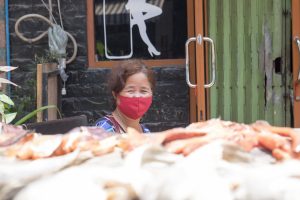Rowdy scenes erupted in Phnom Penh’s few surviving bars, which managed to reopen over the weekend after a six-week curfew was lifted. Too many wanted to believe the pandemic was over and the police responded to the reality, conducting raids across the capital.
The scenes were not dissimilar to elsewhere – the United States, Australia, Europe – where the irrational exuberance of crowds suddenly released from lockdown has no bounds and lacked any sense of social distancing and face masks amid a resumption of alcohol sales.
But Cambodia faces problems which the wealthier countries in the West do not, particularly overcrowding in Phnom Penh, where several people often rent one room, in some cases one bed, to find a few hours’ sleep from the grind outside.
People simply don’t have the space, security, or access to health services and supermarkets enjoyed by those who live in the leafy suburbs of Melbourne, where a cluster of just five cases this week resulted in the re-imposition of severe health restrictions.
In Phnom Penh, food distribution was an issue – starvation was not – because most Cambodians do not have refrigerators and need to buy fresh produce each morning. The closure of markets caused disruptions in the supply chain that lasted a few days.
Street stalls were perched outside deserted bars and shops, meat was sold off the back of pick-up trucks and buses were used to sell fresh produce in the worst hit areas. And the handful of private security guards caught on camera whipping people were dealt with.
True, they showed about as much discipline as an Australian pub bouncer redeployed to ensure quarantine security, only to be caught having sex with the people they’re meant to protect and thus contributing to the spread.
But such atrocious behavior has been on display across the planet ever since the pandemic erupted about 15 months ago, making headlines even if it remains far from the norm.
Where Cambodia has impressed is with its vaccination program, backed strongly by China, Australia, and the United States. Almost 2.7 million people have been fully inoculated out of a population of 16 million, well on the way to a targeted 10 million needed for herd immunity by year’s end.
To date, this country has confirmed 25,761 cases of COVID-19 with 18,359 recoveries and 179 deaths, nearly all since February 20 when two Chinese women bribed their way out of quarantine and went out dancing in the local nightclubs.
Australia, with 25 million people, has confirmed 30,000 cases and 910 deaths and in terms of single doses Cambodia has administered 3.84 million while Australia has carried out 3.6 million jabs.
While it might surprise many that Cambodia is ranked second in its vaccination rollout among the 10 nations of ASEAN, its success stands out further with comparable countries like Nepal where the authorities have bungled much like south of the border in India.
With a population of 28.61 million people, Nepal has confirmed 513,000 cases with 6,343 deaths with just 2.67 million doses given and 554,000 fully inoculated.
This includes claims that more than 100 people at the Mount Everest base camp have contracted COVID-19, which has not deterred hundreds more, wealthy foreigners, from attempting to summit the world’s highest peak.
The main issue, of course, is India and its abject failure in dealing with the disease.
The Indian variant – and potentially many more – and the realities of administering lockdowns in a developing country has added a sense of urgency to the vaccination rollout in Cambodia.
That variant has been detected in five Cambodian construction workers living in Thailand and health authorities here fear it is only a matter of time before it crosses the border.
And confirmed cases have risen each day for the past week, exceeding 500 a day, or about a third more than the seven-day average recorded on April 15 when severe restrictions were imposed that upset human rights activists.
Whether this signals a further spike remains to be seen, but in the meantime Cambodian bars remain closed, restaurants shut early, social distancing and masks are the stuff of daily life and vaccinations are at the ready.
Luke Hunt can be followed on Twitter @lukeanthonyhunt

































